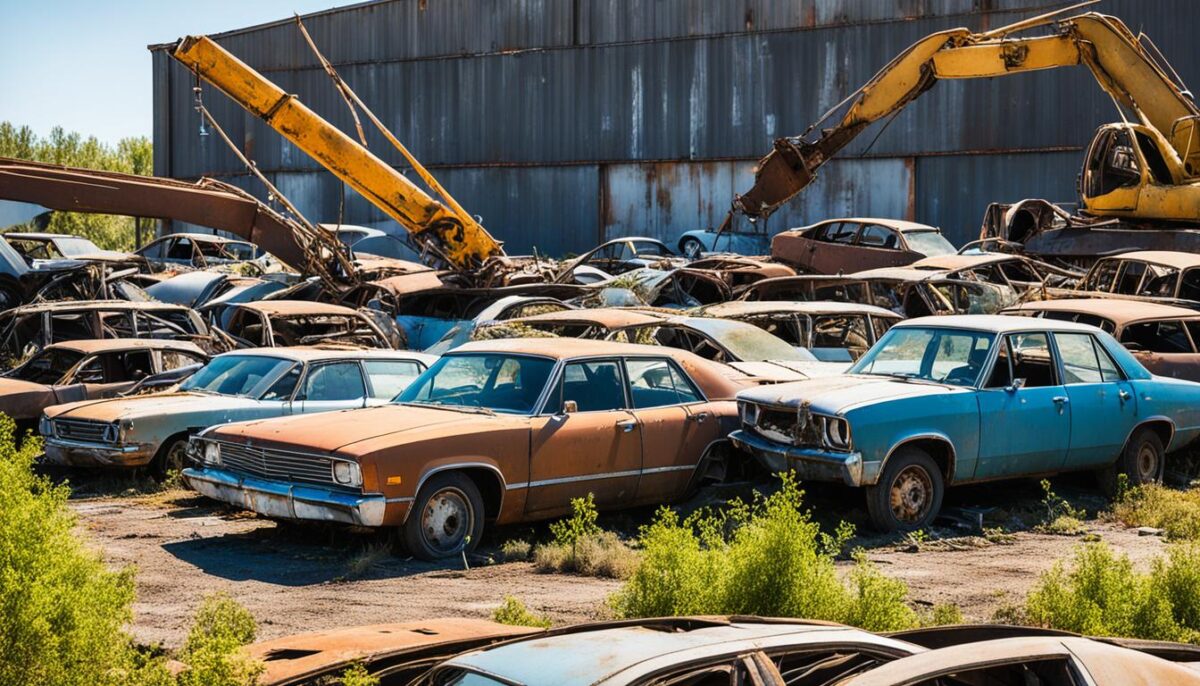
Embark on an exciting journey with us as we explore the dynamic world of salvage auctions. Whether you’re a savvy car enthusiast or a first-time buyer, this comprehensive guide will equip you with the knowledge and strategies to navigate the salvage car market and secure the best deals on these hidden gems. Prepare to uncover the secrets to finding and purchasing top-notch salvage cars that can transform into your dream ride.
In this article, we’ll take you through the ins and outs of salvage auctions, demystifying the process and introducing you to the diverse range of salvage cars available. From understanding the auction dynamics to uncovering the hidden potential of these vehicles, we’ll equip you with the knowledge and strategies to make informed decisions and maximize your investment. Get ready to explore the world of salvage auctions and discover the thrill of finding your next automotive treasure.
Unveiling the World of Salvage Auctions
Salvage auctions are the epicenter of the salvage car market, offering a diverse array of vehicles that have been deemed “salvage” due to various reasons, such as collision damage, theft recovery, or natural disasters. Navigating the world of salvage car auctions can be a thrilling and rewarding experience for savvy buyers, but it’s crucial to understand the intricacies of the auction process and the types of salvage vehicles available.
Understanding the Auction Process
The salvage car auction process typically involves several key stages. First, vehicles are inspected and graded based on their salvage car condition and salvage car grading. This information is then made available to prospective buyers, allowing them to assess the level of damage and potential repair costs. Bidding then commences, with buyers competing to secure the best deals on these discounted vehicles.
Types of Salvage Cars Available
The types of salvage vehicles that can be found at these auctions vary widely. From lightly damaged cars to more extensively repaired vehicles, the range of options caters to a diverse set of buyer needs and budgets. Whether you’re looking for a project car, a daily driver, or a vehicle to resell, the salvage car auction marketplace has something to offer.
| Type of Salvage Vehicle | Typical Condition | Potential Repair Costs |
|---|---|---|
| Lightly Damaged | Cosmetic or minor mechanical issues | Relatively low |
| Moderately Damaged | Significant body damage or mechanical problems | Moderate |
| Extensively Damaged | Major structural or engine issues | High |
By understanding the salvage car auction process and the diverse types of salvage vehicles available, buyers can navigate the salvage market with confidence, identifying the best opportunities and maximizing their investment potential.
Salvage Auctions: A Treasure Trove for Savvy Buyers
Salvage auctions present a unique opportunity for savvy buyers to uncover hidden gems at incredible prices. By navigating these auctions with the right mindset and strategies, we can discover vehicles that have the potential to be restored, repaired, or even resold for a profit. In this section, we’ll explore the benefits of buying salvage cars and share tips on how to maximize your investment, turning your salvage car purchase into a successful venture.
One of the primary benefits of buying salvage cars is the potential for saving money on your vehicle purchase. Salvage cars are often priced significantly lower than their retail counterparts, allowing us to score a great deal on a car that may only require minor repairs or restoration work. This can be a game-changer, especially for those on a tight budget who still want a reliable, high-quality vehicle.
Another advantage of finding hidden gems at salvage auctions is the opportunity to uncover vehicles with hidden potential. Some salvage cars may have sustained only superficial damage, while others may have been involved in a minor accident but are still in excellent mechanical condition. By carefully inspecting these vehicles and understanding their true condition, we can identify hidden gems that can be restored to their former glory, often at a fraction of the cost of a brand-new car.
| Benefits of Buying Salvage Cars | Potential Savings |
|---|---|
| Lower Acquisition Costs | Up to 50% off Retail Price |
| Opportunity to Uncover Hidden Gems | Significant Cost Savings on Repairs |
| Chance to Resell for Profit | Potential for Substantial Resale Value |
By embracing the world of salvage auctions and saving money on salvage cars, we can unlock a world of exciting possibilities. Whether you’re looking to restore a classic, find a reliable daily driver, or even explore the potential of reselling vehicles for profit, salvage auctions offer a treasure trove of opportunities for the savvy buyer.
“Salvage auctions are like an untapped goldmine for those who know how to navigate them. The key is approaching each auction with an open mind and a keen eye for hidden value.”
So, if you’re ready to embark on a rewarding journey and discover the benefits of buying salvage cars, buckle up and get ready to uncover the hidden gems that await you at the next salvage auction.

Strategies for Maximizing Your Salvage Car Investment
Purchasing a salvage car can be a savvy financial decision, but it requires a meticulous approach to ensure you make the most of your investment. In this section, we’ll guide you through the process of thoroughly inspecting salvage vehicles, highlighting the key areas to focus on and providing a comprehensive checklist. Additionally, we’ll share valuable bidding tactics and tips to help you navigate the competitive landscape of salvage auctions and increase your chances of securing the best deals.
Inspecting Vehicles Thoroughly
When it comes to inspecting salvage cars, attention to detail is crucial. Start by conducting a comprehensive visual inspection, examining the exterior for any signs of damage, dents, or rust. Open the doors, hood, and trunk to assess the condition of the interior, paying close attention to the upholstery, dashboard, and electrical components. Don’t forget to check the engine and transmission, as these are the heart of the vehicle.
To ensure you don’t miss any critical issues, refer to our salvage car inspection checklist:
- Exterior: Check for dents, scratches, rust, and panel alignment
- Interior: Inspect the condition of the seats, dashboard, and electrical systems
- Underbody: Examine the frame, suspension, and undercarriage for any damage
- Engine and Transmission: Assess the overall condition, oil levels, and fluid leaks
- Test Drive: Take the vehicle for a test drive to evaluate its performance and handling
Bidding Tactics and Tips
Navigating the bidding process at salvage car auctions can be a daunting task, but with the right strategies, you can increase your chances of securing the best deals. Start by researching the fair market value of the vehicles you’re interested in, so you can set your maximum bid accordingly.
Additionally, consider the following tips to improve your salvage car bidding tactics:
- Arrive early and inspect the vehicles thoroughly before the auction begins
- Set a maximum bid and stick to it, even if the bidding gets competitive
- Look for less popular or harder-to-sell vehicles, as they may fetch lower prices
- Consider bidding on vehicles with minor cosmetic damage, as they can often be repaired at a lower cost
- Stay focused and disciplined throughout the auction, avoid getting caught up in the excitement
By combining a thorough inspection process with strategic bidding tactics, you’ll be well on your way to maximizing your salvage car investment and driving home a hidden gem.
Navigating the Paperwork and Legal Requirements
Buying a salvage car can be an exciting prospect, but it also involves navigating a maze of paperwork and legal requirements. As we embark on this final section, we’ll guide you through the necessary steps to ensure a smooth and compliant salvage car purchase.
Firstly, understanding the documentation required is crucial. From the vehicle’s salvage title to the necessary bills of sale and transfer forms, we’ll ensure you have a clear understanding of the paperwork involved. By familiarizing yourself with these documents, you’ll be better equipped to navigate the registration process with ease.
Next, we’ll delve into the legal requirements for buying salvage cars. Each state has its own regulations when it comes to registering and insuring these vehicles. We’ll provide you with the essential information to comply with your local laws and regulations, helping you avoid any pitfalls or unexpected hurdles along the way.
